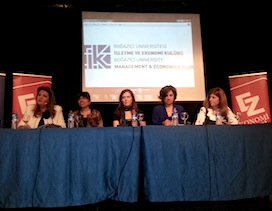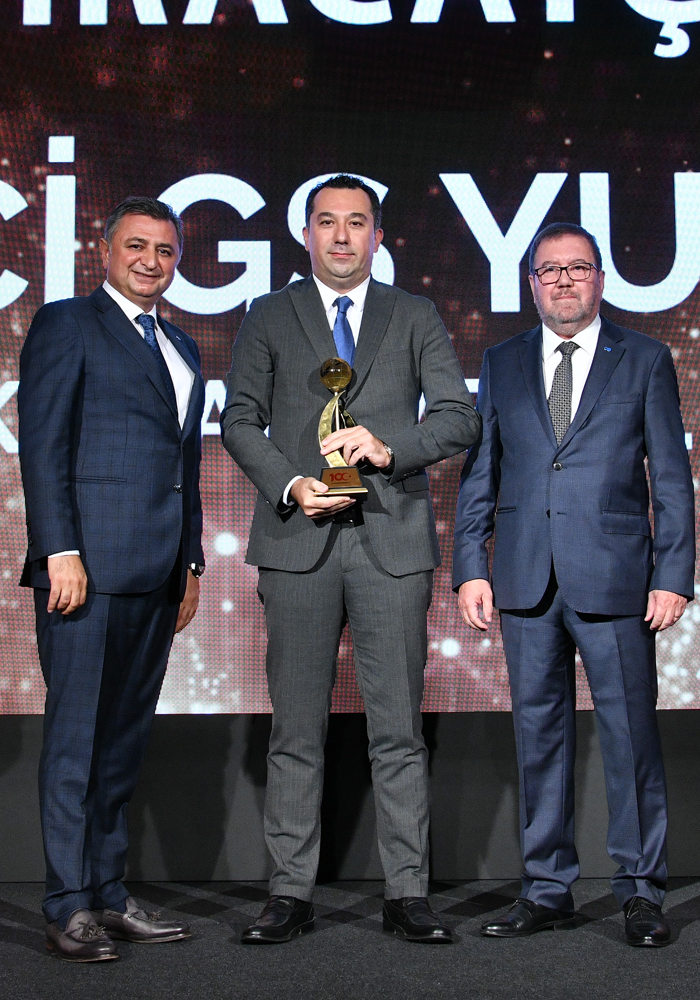- Get to know İnci
- About Us
- Sectors and Organizations
- Being a Part of the İnci Family Being a Part of the İnci Family
- Social Responsibility Social Responsibility
- Sustainability
- Media Center Media Center
- Legal Notices Legal Notices
- Contact
Media Center


President of İnci Holding Perihan İnci at Boğaziçi University
2 Temmuz 2017President of İnci Holding Perihan İnci speaks at the panel on Women Actors Directing the Turkish Economy during the Boğaziçi University Economy Summit on 9 April 2013.
Starting with figures on the İnci Group, Perihan İnci said, ‘I grew up in a region and a family where women are valued. All of us five sisters were well educated, thanks to our mother’s invaluable support; and today, we all have a voice in the world of business. I firmly believe in the crucial importance of the mother model. It is they who raise the children – boys and girls alike. It is they who should equip young children with the conviction that girls have to work as hard as boys, and can be as successful. It is they who should teach boys that girls also have a place at work, and that the girls they will one day marry must also work. How mother placed a great deal of importance on the education and employment of women. She always said, ‘I’ll give you a good diploma rather than a trousseau.’ Our father fully supported her and gave us the chance to learn from him. The view that business cannot survive in the absence of sons is widely held by business owners, that girls cannot take over. Which leads to the loss of countless 25-30-year-old companies that were built with such hard work, and had created value for our economy. İnci Holding, on the other hand, proves the opposite.’
Being a woman posed her no difficulty at work, and was usually treated with respect, she said, before continuing, ‘I have witnessed suspicion more abroad, to be honest. And, again, I had to contend with more discrimination because I am a woman. Worse still, this happened among highly educated people… In other words, attitudes towards managers are no better or worse in our country than in others.’
She continued, ‘Let us avoid this mistake: Only female managers or only male managers… The best result can be achieved by management in which both work in balance.’
Then she attempted to explain why women have come to the forefront in recent years, especially after the 2008 crisis:
‘Would Turkey and other countries in the world push women to the forefront if there had been no act of providence or if solutions did not mandate women?
‘Demographic reasons necessitate increasing women’s employment.
‘Women have demonstrably proven to be more successful during crises.
‘As women’s purchasing power grows, so does their influence on decisions concerning consumption. They effectively expand the range. This is crucial to rebalancing the economies.’
Mentioning the results of the Economist Magazine on 50 Women Managers Directing Turkish Economy survey, Perihan İnci stated that although women’s participation in the labour force in Turkey is 29% according to Thornton’s 2011 year data, women managers is about 31%:
‘This means we exceed the global average of 21%. Except, the higher you go, the fewer the female managers. According to Hay Group research over the past 5 years’ data of 625 companies, women generally serve as medium-level managers. Whilst 23% of the medium-level managers were women in the companies surveyed, senior women managers were a mere 11%. Low as it might seem, this rate is still a lot higher than the world average. Moving up to CEO, Country Manager or General Manager positions, on the other hand, is still a challenge. In other words, that is where the glass ceiling comes into play
A survey on 100 Women CEOs reveals that 75 % of women managers are working for international companies, or for companies with foreign shareholders, and that includes women CEOs in charge of the largest turnovers. İnci also stated that 60% of women managers experience difficulties due to breaks for weddings and maternity leave, for instance, and balancing a highly-charged career with a home life.
Pointing to women’s participation in the workforce in Turkey, which is 29%, she said this exceeded the world average of 21%.
Acknowledging her privilege as the President of Board of Directors of a company with five women directors in the Management Board, Perihan İnci continued:
‘Women CEOs in Turkey are at 12%; Finland ranks top in the world with 13%. The global average for women CEOs is 5%, and reaching 11% – gratifying as it is, it still is no reason to sit back on our laurels: in terms of women’s employment, we lag well behind many developed countries.
‘Women leaders average 21% in the world, 24% in Latin America, 28% in Europe, 21% in Asia, and only 18% at senior management level in North America. There is a Bill before the European Commission concerning the necessity to increase the number of woman non-executive members of Board in publicly listed companies to 40% by 2020. To this end, the necessary legal arrangements have to be done. Norway is a good example in this context; the rate, which was 7% in 2002, rose to 40% in 2012 following new regulations. Since there isn’t an adequate number of educated women senior managers, however, only 70 women serve one 300 Boards of Directors. This reveals the need to focus on training women managers from lower levels. There is a need for focus and effort on both government and corporate side. It is also necessary to establish a stronger infrastructure by various sectors. It is necessary to create strategies to develop women managers. The most important thing is awareness of mental barriers that keep women behind to such a degree, and to develop policies in terms of language and culture.
‘A key reason behind these efforts to develop strategies is to add women to the workforce in places like Europe where the population is ageing. Moreover, if the workforce rate remains at the current level, the loss of labour will be as much as 14%. Measures such as longer maternity leave, extra paternity leave and flexible working hours intend to raise the birth rates. In Eastern Asia, 83 women work per 100 men, a rate far in excess of OECD averages.
‘Despite shrinking or stagnant population increases, growth in developed countries will increase in line with women’s participation levels in the workforce.
‘Likewise, investment in the education of girls as much as that of boys in developing countries or their participation in the workforce will provide the biggest economic and social return.
‘As human capital is the biggest source of ensuring competitive advantage, and the pool of highly qualified workers fall along with demographic crises, ensuring women’s participation in the workforce is now essential rather more than a lofty ideal.
‘According to research carried by Credit Suisse on 2500 companies, companies with one woman director in the executive board have enjoyed 26% better performance since 2005 than those with none.
‘Since women have better scores in organisational activity, they tend to be more open for discussion and their presence leads to better decisions since the expression of different ideas is encouraged. Companies managed by women ensure better growth and equity profitability by 4%. Although the benefits of having women leaders are clear, there is room for improvement.
‘Whilst progress is made in many countries of the world in educating girls, where are women with university degrees? When we look at the statistics in Turkey, 49.8 % (37,671,216) of our population is women, 5,556,504 of whom participate in the workforce. This comprises training of every level. 2,512,880 women have university education.
‘These figures suggest that most female university graduates are not working; why is it? Why can’t they? Their families and this country have paid to raise them into degree holders. These women have to participate in the workforce.’
Perihan İnci ended her speech by advising the young to receive education and to train themselves in order to ensure they will get jobs that will make them happy.
Share Social
Latest News

GS Yuasa inaugurates massive 178 thousand square meter GS Yuasa logistics facility in the UK
15 Ekim 2023GS Yuasa has announced the opening of GS Yuasa Europe LTD Headquarters in the UK, which stands as Europe’s largest distribution and warehouse facility, designed to serve as a gateway to the future.

EAS, one of Turkey’s first battery brands, introduces its product series for new generation vehicles on its 60th anniversary
11 Temmuz 2023In celebration of its 60th anniversary, EAS, one of Turkey’s first battery brands and currently operating under İnci GS Yuasa, presented its updated product portfolio to its dealers, catering to a wide range of new generation vehicles.

